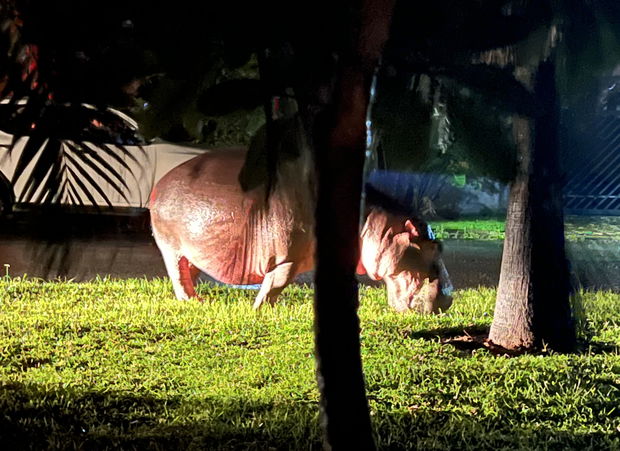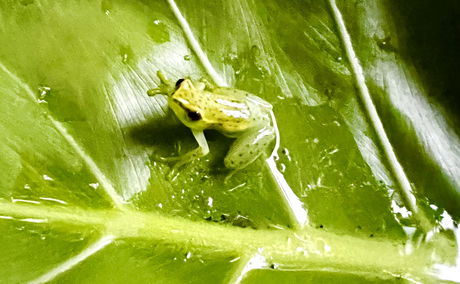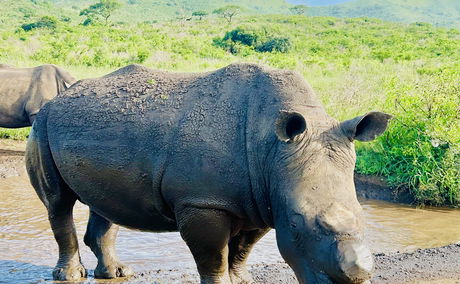A rare and unforgettable sighting in Hluhluwe-iMfolozi There are moments in the bush that linger long after the dust settles and the engine switches off. Moments when the wilderness feels alive in a different way — charged, electric and full of quiet tension. They are not always dramatic or loud. Often, they unfold in silence, in a slow unfolding of awareness that something extraordinary is about to happen.
St Lucia, where Hippos Roam the Streets – Fascinating Facts About Our Most Famous Residents

As dusk settles over St Lucia, the sound of grunts and splashes drifts across the estuary. Soon, dark shapes begin to emerge from the water, heading up the same well-trodden paths they have used for generations. For many first-time visitors, it is almost unbelievable to see, hippos wandering the streets of town, grazing on verges, or ambling past restaurants as if they own the place.
And in many ways, they do. Hippos are the undisputed icons of St Lucia, drawing visitors from across the globe to witness this remarkable coexistence of humans and wildlife. The phenomenon has made St Lucia world-famous, yet the hippos themselves are far more than a quirky tourist attraction. They are ancient, complex creatures with surprising traits that reveal just how extraordinary life on Africa’s waterways really is.
The Hippo in Context
The name “hippopotamus” comes from ancient Greek, meaning “river horse.” But despite the name, hippos are not related to horses at all, their closest living relatives are actually whales and dolphins. This evolutionary link explains their semi-aquatic lifestyle and many of their adaptations for life in water.
Weighing up to three tonnes, the hippopotamus is the third-largest land mammal after elephants and rhinos. Yet, unlike those giants, hippos live a dual existence: water by day, land by night. They are perfectly designed for this rhythm, with eyes, ears, and nostrils positioned high on their heads so they can stay mostly submerged while still breathing and keeping watch.
Daily Life of a Hippo
A hippo’s day is deceptively calm. For most of the daylight hours, they wallow in rivers, lakes, or estuaries, protecting their skin from the sun and regulating their body temperature. Their social groups known as pods, schools, or bloats can include up to 30 individuals, led by a dominant male.
After sunset, the calm changes to activity. Hippos leave the water and fan out across the landscape to graze. They are surprisingly methodical: each individual follows a set route, worn into the earth over decades, leading them to the grasses they rely on. In a single night, one hippo can consume 35–40 kilograms of vegetation.
In St Lucia, this behaviour brings them into town. Well maintained gardens, parks, and grassy verges offer easy pickings, and so the hippos wander among streetlights and houses before returning to the estuary at dawn.
Hippos of St Lucia, A Thriving Population
The St Lucia Estuary supports one of the largest hippo populations in South Africa, estimated at around 800 individuals. The abundance of fresh water, grazing, and shelter makes this an ideal habitat. Their numbers are not only impressive but also vital: hippos are considered “ecosystem engineers.” By feeding on land and depositing nutrients back into the water through dung, they help fertilise aquatic ecosystems and support fish populations.
This abundance of hippos, combined with the unique layout of the village of St Lucia, within the iSimangaliso Wetlands Park, creates the extraordinary spectacle of wild hippos moving through a human settlement. It’s a rare and delicate balance between people and wildlife, one that fascinates biologists and visitors alike.
Fascinating Facts About Hippos
They don’t actually swim: Hippos move through water by walking or bouncing along the bottom. Despite appearances, they are not buoyant enough to float easily.
Built-in sunscreen: Their skin excretes a reddish oily fluid—nicknamed “blood sweat”—that acts as a sunscreen and has antibacterial properties.
Surprising agility: On land, they can sprint at 30 km/h for short distances, faster than most humans can run.
Powerful voices: A hippo’s calls and bellows can reach 115 decibels—louder than a rock concert—and can travel over a kilometre across water.
A dangerous reputation: Hippos are responsible for more human deaths in Africa than lions or elephants. Their unpredictable nature means keeping a respectful distance is essential.
Long-lived giants: In the wild, hippos can live up to 40 years, with some in protected environments reaching their late 50s.
The Soundtrack of St Lucia Nights
Ask any guest who has stayed in St Lucia what they remember most vividly, and chances are they will mention the sound of hippos. Their grunts, groans, and booming calls carry across the estuary and drift through the village streets at night. It is both a lullaby and a reminder that this is not an ordinary town.
Walking home after dinner, you may hear the crunch of grass nearby and catch sight of a massive silhouette grazing quietly on a lawn. It is an encounter that leaves even seasoned travellers awestruck: a wild, three-tonne animal living in harmony, albeit carefully, with human neighbours.
How to Safely View Hippos in St Lucia
Part of the magic of St Lucia is the possibility of seeing hippos not only on an estuary cruise but also right in the village itself. However, it’s important to remember that while they may seem calm, hippos are powerful and unpredictable wild animals. A safe and respectful distance ensures both your safety and theirs.
Keep Your Distance: Never approach a hippo on foot, whether in town, on the roadside, or by the water. Give them plenty of space and change your route if necessary.
Do Not Startle Them: Hippos are easily startled. Avoid loud noises, sudden movements, or shining bright lights directly at them.
Stay in Vehicles at Night: If you encounter a hippo on the road, remain in your car until it has moved off. They can outrun a human easily.
Choose Guided Experiences: The safest and most rewarding way to observe hippos is on a guided boat cruise along the St Lucia Estuary, where you’ll learn fascinating insights from experienced guides.
Respect Their Routine: Remember that hippos are in town to graze. Blocking their path or attempting to get too close for a photograph can provoke aggression.
By observing these simple guidelines, visitors can enjoy unforgettable hippo encounters while helping to protect one of St Lucia’s most treasured inhabitants.
A Wild Encounter Like No Other
The hippos of St Lucia are more than a spectacle, they are living proof that people and wildlife can share space when respect is at the centre of coexistence. Nowhere else on earth can you finish dinner, step outside, and meet a hippo on its nightly wander.
When you visit, watch the estuary at sunset, listen for the deep grunts that roll through the village at night, and if you’re lucky, catch a glimpse of a hippo grazing by the roadside. It is an encounter that captures the very essence of St Lucia: a place where Africa’s wild heart is not just nearby—it walks the streets with you.
Further Reading
St Lucia is often described by what surrounds it, a small coastal town enveloped by the remarkable iSimangaliso Wetland Park, where estuary, forest, dune systems, and ocean converge. Here, nature is not confined to distant viewpoints or fenced reserves. It threads itself through daily life, moving quietly between gardens, along sandy paths, beneath leaves, and across walls. While larger animals understandably capture the imagination, another world exists alongside them — smaller, subtler,...
St Lucia is not a destination built around ticking off attractions. It’s a place shaped by tides and wildlife, early mornings and quiet evenings — where the most memorable moments tend to unfold slowly rather than on demand. That’s why one of the most common questions we receive from guests planning a visit is also one of the most important: “How many nights should we stay?” The answer has less to do...





Share This Post